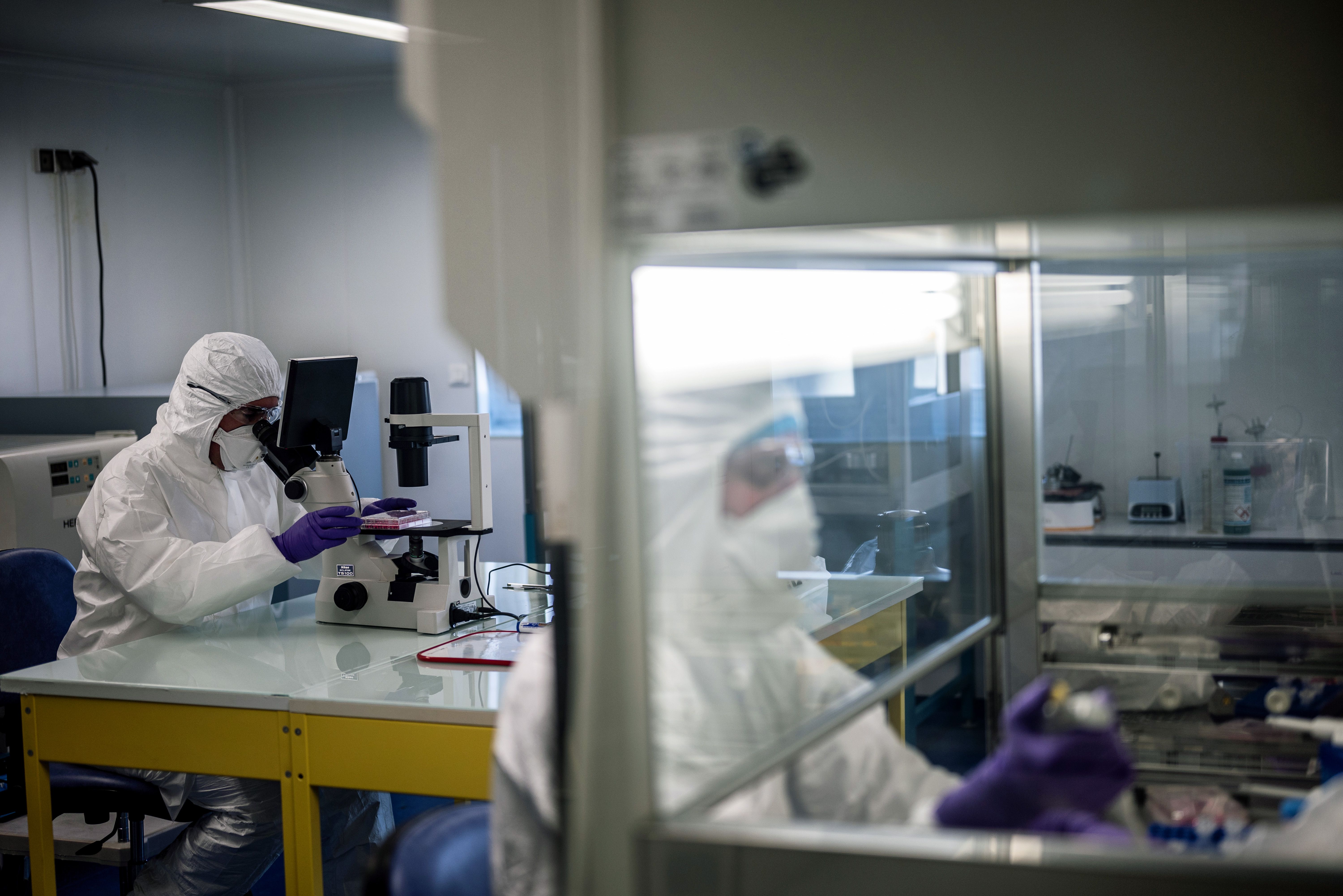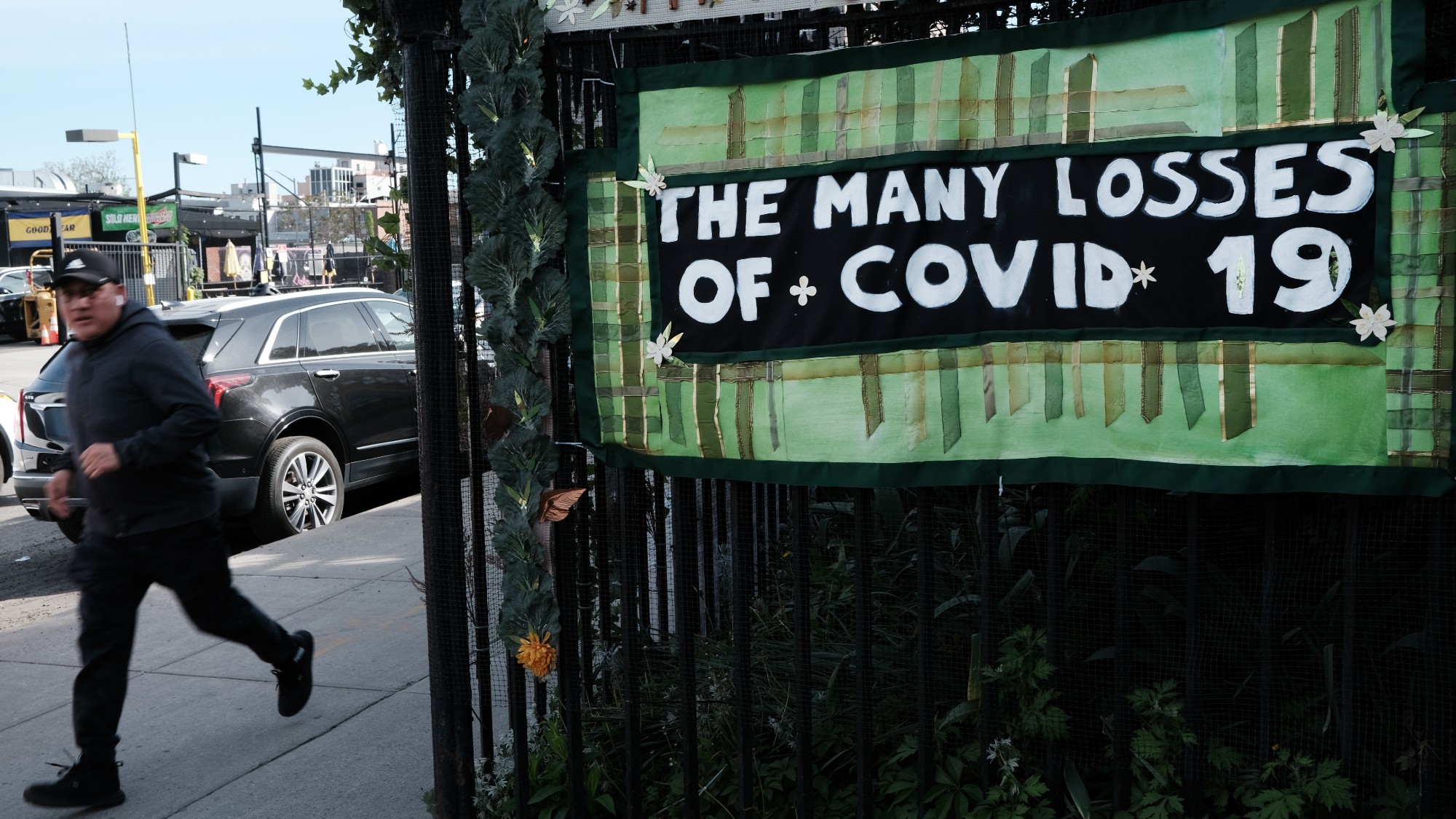The next generation of vaccines
How are vaccine researchers and developers responding to COVID-19's evolution?

A free daily email with the biggest news stories of the day – and the best features from TheWeek.com
You are now subscribed
Your newsletter sign-up was successful
How are vaccine researchers and developers responding to COVID-19's evolution? Here's everything you need to know:
Are COVID vaccines working?
Yes — amazingly well. The vaccines have remained highly effective in preventing serious illness and death, despite the evolution of the coronavirus into more infectious, immunity-evading new variants. British data indicate that the risk of death between last July and December was 81 percent lower for people who had two doses of a COVID vaccine — including Pfizer's and Moderna's shots — and 93 percent lower for those who received a third. An unvaccinated adult is 68 times more likely to die from COVID than a boosted one. But the Omicron variant, which has more than 30 mutations in its spike proteins, has rendered vaccines less effective at preventing breakthrough infections, and recent evidence suggests boosters' protections against symptomatic infection wane after 10 weeks. The subvariant BA.2 is now spreading in at least 10 countries in Europe and Asia, and new variants are likely to emerge after that, especially since undervaccinated communities help incubate new mutations.
The Week
Escape your echo chamber. Get the facts behind the news, plus analysis from multiple perspectives.

Sign up for The Week's Free Newsletters
From our morning news briefing to a weekly Good News Newsletter, get the best of The Week delivered directly to your inbox.
From our morning news briefing to a weekly Good News Newsletter, get the best of The Week delivered directly to your inbox.
What about boosters?
The Centers for Disease Control and Prevention recommends them for all adults, and in January it approved a fourth dose for people with severely weakened immune systems. Scientists are studying emerging data on the effectiveness of another booster, and the Food and Drug Administration said this week it is possible one will be recommended in the fall, at least for people over 65. Moderna and Pfizer are both developing Omicron-tailored vaccines, and Pfizer initially predicted its version would be available in March. But production has hit delays, and with one University of Washington model suggesting that 73 percent of Americans have some immunity to Omicron, it might not be necessary to target that variant alone — or to play catch-up with those that follow. It takes four to six months to get new batches of variant-specific vaccines ready for distribution, and new variants can spread much more quickly. "Relying on new boosters every time we have a new variant of concern," said MIT immunologist Padmini Pillai, "is not a viable strategy."
What would work better?
Vaccine developers are now taking a variety of approaches to outpace viral evolution. The holy grail would be a pan-coronavirus vaccine, which would protect recipients against all forms of SARS-CoV-2, the virus that causes COVID, and possibly even against all beta-coronaviruses. That means it could fight highly deadly viruses such as SARS-CoV-1 — the virus that caused the 2003 worldwide SARS outbreak — and MERS, as well as the four viruses that cause a quarter of all common colds. In December, scientists at the Walter Reed Army Institute of Research announced that their vaccine produced neutralizing antibodies against COVID and SARS in monkeys. That research team recently completed the first phase of testing on humans. Other researchers are searching for a "conserved site," a common feature that coronaviruses keep throughout their mutations and that could be targeted by a universal vaccine. Researchers at Duke have isolated an antibody that binds to both SARS-CoV-1 and SARS-Cov-2.
A free daily email with the biggest news stories of the day – and the best features from TheWeek.com
How likely are such vaccines?
Many hurdles remain, and Dr. Anthony Fauci, President Biden's chief medical adviser, has warned that they will "take years to develop." The Norway-based Coalition for Epidemic Preparedness Innovations has allocated $200 million for pan-coronavirus research and aims to see one distributed by 2024 or 2025. But the supply chain for vials and other vaccine equipment is under unprecedented strain, with many manufacturers prioritizing supplies for already-existing vaccines over experimental ones. And because most people now have at least some immunity via vaccines, previous infection, or both, it has become much harder for researchers to find people with no previous exposure to serve as control subjects.
What can be done in the meantime?
Developed countries will continue to promote boosters; only 28 percent of the U.S. population has had one. Pfizer chief executive Albert Bourla said in January that he hopes to develop once-a-year boosters, but other experts disagree on how frequently they will be needed, or if three shots will provide lasting protection against serious illness. With under 11 percent of people in low-income countries even partially vaccinated, the World Health Organization and many virologists are urging governments and drugmakers to focus on vaccinating the rest of the world. The U.S. and other G-7 nations have fallen short of the 1.4 billion vaccines they pledged to donate by 2022, but some vaccine innovators are trying to fill in the gap. Novavax and Corbevax recently produced inexpensive vaccines that rely on recombinant protein technology to mimic spike proteins. These vaccines can be stored in regular refrigerators instead of the super-cold storage required for the Pfizer and Moderna vaccines, making them more easily distributed in poor, remote areas. The developers of Corbevax, Drs. Maria Elena Bottazzi and Peter Hotez of Texas' Baylor College of Medicine, were funded by $7 million in private philanthropy and are not patenting their vaccine. They are working with an Indian firm to produce 1 billion shots for developing nations. "Global vaccine equity," they wrote in a recent Scientific American article, "is the only thing that can bring the COVID pandemic to an end."
A vaccine in a nasal spray
Not all 330-plus COVID vaccines currently in development are shots. Injected vaccines generate antibodies in the blood — but don't provide much protection in the nose, which is the virus' most common entryway. So scientists are working on vaccines that can be sprayed into the nose. At least 12 such vaccines are currently in development, with one produced by India's Bharat Biotech already in a Phase 3 trial. Nasal COVID vaccines would target the source of most infections, allow patients to self-administer, and make for an attractive alternative for those who fear needles — including children. Yale immunologist Akiko Iwasaki, who led a study on nasal vaccines, predicts they'll be most useful as boosters for vaccinated people. "Then you can leverage the existing immunity," she said. "It's really like putting the guard outside the door as opposed to inside the door." If effective nasal vaccines can be developed and widely adopted, scientists say, it could dramatically reduce transmission and bring the pandemic to an end.
-
 6 exquisite homes with vast acreage
6 exquisite homes with vast acreageFeature Featuring an off-the-grid contemporary home in New Mexico and lakefront farmhouse in Massachusetts
-
 Film reviews: ‘Wuthering Heights,’ ‘Good Luck, Have Fun, Don’t Die,’ and ‘Sirat’
Film reviews: ‘Wuthering Heights,’ ‘Good Luck, Have Fun, Don’t Die,’ and ‘Sirat’Feature An inconvenient love torments a would-be couple, a gonzo time traveler seeks to save humanity from AI, and a father’s desperate search goes deeply sideways
-
 Political cartoons for February 16
Political cartoons for February 16Cartoons Monday’s political cartoons include President's Day, a valentine from the Epstein files, and more
-
 The billionaires’ wealth tax: a catastrophe for California?
The billionaires’ wealth tax: a catastrophe for California?Talking Point Peter Thiel and Larry Page preparing to change state residency
-
 Bari Weiss’ ‘60 Minutes’ scandal is about more than one report
Bari Weiss’ ‘60 Minutes’ scandal is about more than one reportIN THE SPOTLIGHT By blocking an approved segment on a controversial prison holding US deportees in El Salvador, the editor-in-chief of CBS News has become the main story
-
 Has Zohran Mamdani shown the Democrats how to win again?
Has Zohran Mamdani shown the Democrats how to win again?Today’s Big Question New York City mayoral election touted as victory for left-wing populists but moderate centrist wins elsewhere present more complex path for Democratic Party
-
 Millions turn out for anti-Trump ‘No Kings’ rallies
Millions turn out for anti-Trump ‘No Kings’ ralliesSpeed Read An estimated 7 million people participated, 2 million more than at the first ‘No Kings’ protest in June
-
 Ghislaine Maxwell: angling for a Trump pardon
Ghislaine Maxwell: angling for a Trump pardonTalking Point Convicted sex trafficker's testimony could shed new light on president's links to Jeffrey Epstein
-
 The last words and final moments of 40 presidents
The last words and final moments of 40 presidentsThe Explainer Some are eloquent quotes worthy of the holders of the highest office in the nation, and others... aren't
-
 The JFK files: the truth at last?
The JFK files: the truth at last?In The Spotlight More than 64,000 previously classified documents relating the 1963 assassination of John F. Kennedy have been released by the Trump administration
-
 'There is a certain kind of strength in refusing to concede error'
'There is a certain kind of strength in refusing to concede error'instant opinion 'Opinion, comment and editorials of the day'